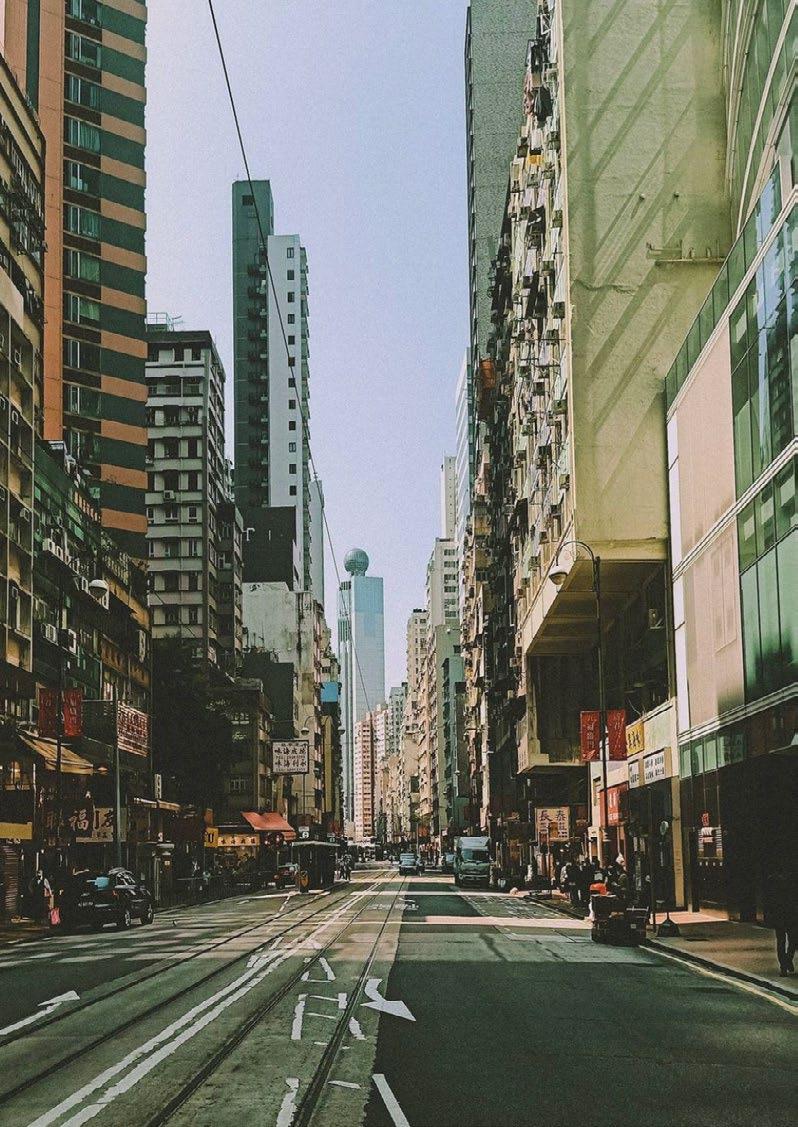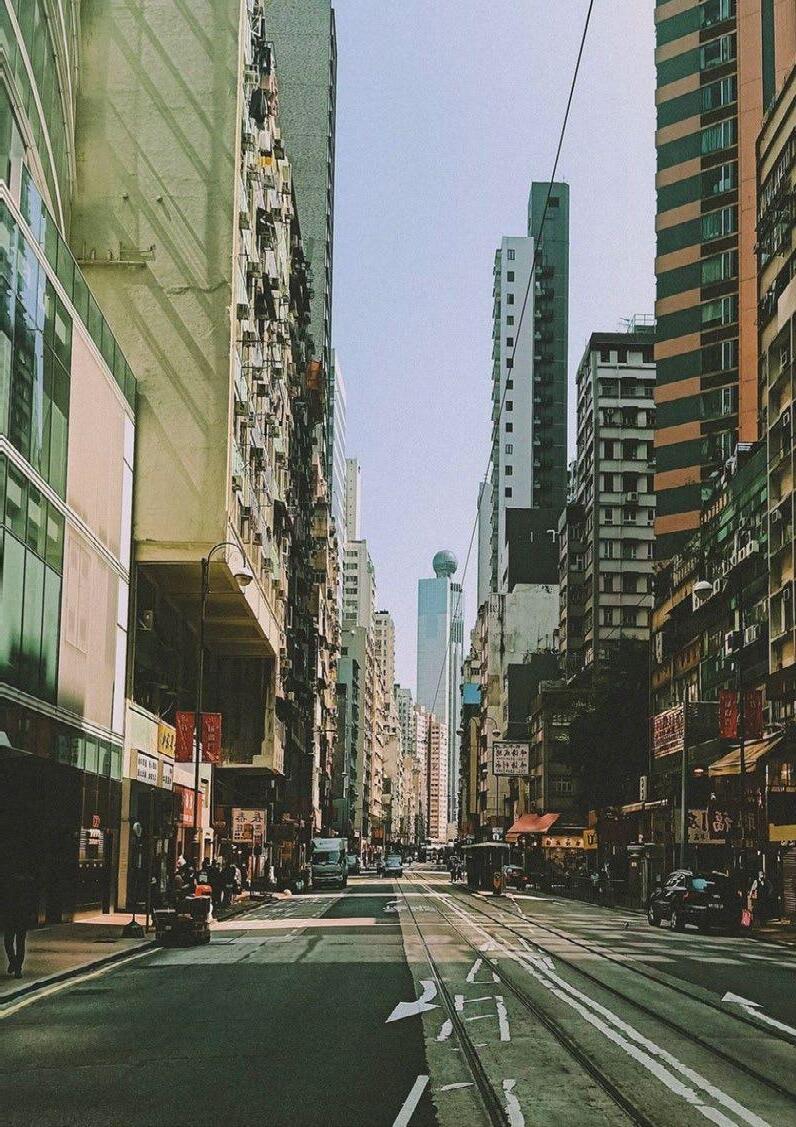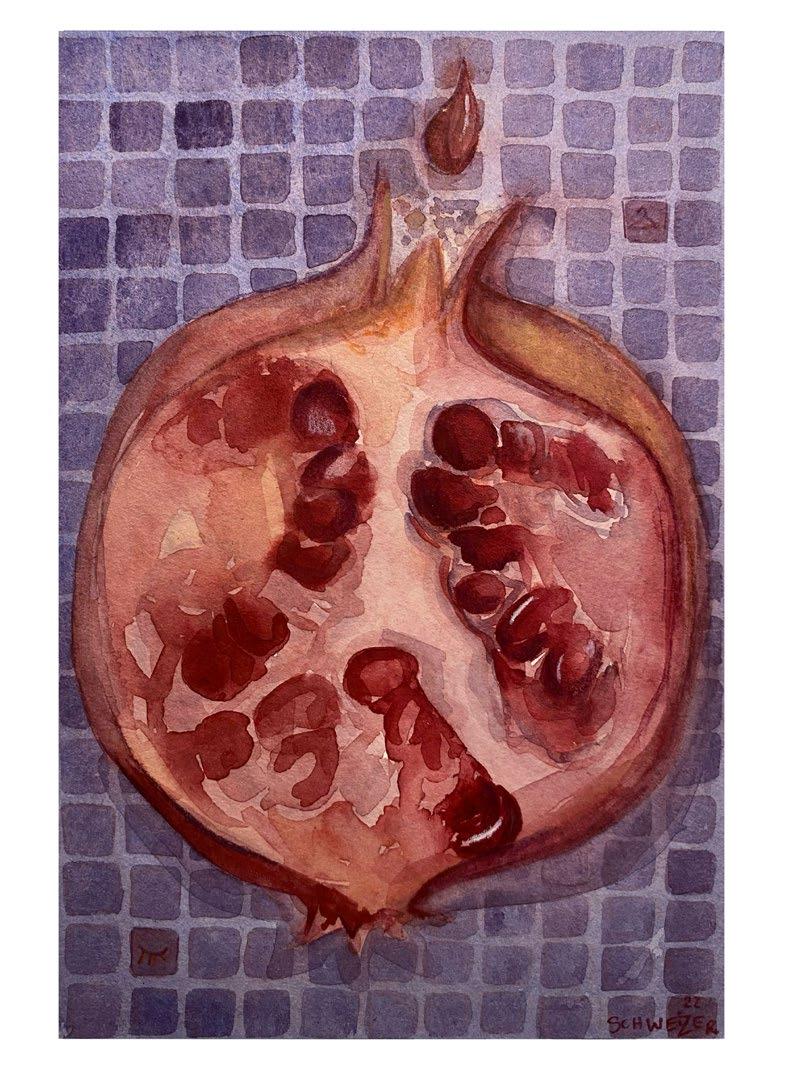
7 minute read
Artist’s Statement
In Twelfth Night, Shakespeare used the willow tree as a symbol of unrequited feelings. The word “unrequited” entails in itself immense affliction, of effort not rewarded with consequence; of fervored involvement met with passive dismissal. “Willowed Belonging” brings to paper my belonging (to places and to people) that had always remained unrequited—never returned in full measure, something I had always associated with the very complex procedure of “growing up and growing out.”
There is an inherent amount of discomfort innate to the phenomenon of “growing up.” It is unsettling. Chagrin sits poised, hanging sulkily above my every thought and every interaction. The melancholy of my past chokes my present, whose vulnerable whimpers have so often been subdued that suspension has become elemental to me. My emotions find themselves on a slinging continuum of paralysis. with action frozen from fear of what might go wrong, without ever bothering to wonder, for once, what might go right.
Advertisement
My apprehensions rest heavy and unmoving on my opportunities and possibilities, where every smile feels like a burden, an unknown, unearned privilege. What is my place, after all? Where exactly do I lie on the spectrum of happy smiles and gloomy sighs? I am “half agony, half hope,” as Austen has said. Unbeknownst to me, a hunger feasts hungrily on every laughter attained despite incredible friction of thought. To think, for me, is to drown headlong into chaos, spiralling deep and hard. It is frozen cowardice in the face of every life-inducing euphoria; “to think” is my Achilles’ heel. Inaction builds itself into a charnel house in my heart. At every moment, my belonging is willowy—it’s unrequited.
- Karizma Ahmed
Karizma is a second-year English major at Miranda House who is oddly proud of her name. Melancholic with a tinge of humor, she goes through her life in ephemeral moments of euphemistic passivity. Naturally exhausted and perpetually overworked, she struggles to strike a balance between ambition and availability. She survives life with good music and trashy rom-coms.
Louisa Choi is a 19 year old Korean-American poet and writer who has grown up in Hong Kong and is currently living in New York City, studying psychology. Hong Kong’s very own contemporary Sylvia Plath, her work is centred around mental health and childhood. She has had her work published in [insert accomplishments here], and has also worked with All My Friends Zine. Some notable works that she has published include: ‘Yes, I Am the Poet’, and more recently ‘A Farewell to Childhood’.
I frequently see your work linked to mentions of mental health. How would you say your experience with mental health struggles has influenced your artwork?
Immensely. I write almost only about my mental health struggles. Obviously I dip into other stuff here and there but one of my strongest and most difficult battles that I have experienced and am still experiencing in my life have been mental health. My work will always reflect what is going on in my life, so for that reason they go hand-in-hand. I get questions sometimes, for example, do you rely too much on your mental health struggles for inspiration, but I don’t think it is about being sad to produce good writing. I understand that some people make that assumption that I have that going through my head, but it is more because I am just like any other human being who goes through ups-and-downs too, and I write about those as honestly as possible. For me, it just coincidentally ended up being about mental health, it was never ever supposed to be just like ‘I have mental health issues, so I am going to write about them’. When I was eleven and I started writing, I had no idea what mental health was. It just naturally became that. Will it always stay that way? I have no idea, but for now, it is where my writing is most therapeutic, most helpful to me, so it will stay that way for awhile.
What is your creative process like? Where is your favourite place to write?
So like I was saying, I actually have no professional training in writing. I plan to try to take a poetry class in university next semester. My creative process is not really a thing. I simply write. I open my notes app, and I sit and write. My favourite place to write is the MTR. I love sitting on the subway, pull up my phone, and writing the saddest stuff I ever write.There is something about the juxtaposition of doing something so mundane while also doing something so dramatic, but it is only me, and only I know what I am doing. So, I would say my favorite place to write is on the subway, and that my creative process is just word vomit. I write the best when I am at my most weird and unfiltered with my writing. I like to use conventional words in an unconventional way. That is my favourite type of writing, so I just try to be weird but true to myself when possible,
If you had to sit on a long MTR ride with someone (they can be dead or alive, famous
or not), who would it be and why?
Photography by Chloe Brooke

I mean, of course I would say Taylor Swift. I would die (metaphorically) if I met her, because she has been my inspiration for my whole life. That is the expected answer of me, so if I was to give a different, slightly less expected answer, the first thing that comes to mind would be one of my friends, my mother, or people who are close to me in my life. I would love to spend time with them and that is a really meaningful thing to me. I don’t fantasise about meeting any celebrity aside from Taylor Swift, so either just her, or my close friends.
I know that you are inspired a lot by Taylor Swift, and I feel like some more highbrow literary critic people would say that pop music does not count as a form of ‘art’, what are your thoughts on this?
I think that is stupid. Art is art. You can’t say that a piece of art isn’t art because it is popular If that is the case, then Van Gogh and Picasso would not be artists. I think that anything, even what a three-year-old might create with a bit of paint and a paintbrush is art. Art is very subjective, and the critics that say that popular music is not art are just critical of their own insecurities. But I also think that popularity does not make art better or worse. I say that to myself because I know that I have a large following on Instagram. That does not make me better or worse than any writer, I just think that that makes me more socially popular. Being popular does not mean the art is good, it is just being circulated more. And I understand, to a certain extend, why people think that pop music is not art, because they use formulas and certain melodies they know are popular, and it gets monetized, but I think that, if you make a song only to go viral, it would not do well. In that case, you could say that that is less artistic. But who is to say that creating formulas counts as not being ‘artistic’? That could be an art in itself, so I think that people can have their preferences, but to go to extends to claim that a piece is ‘not art’, is a statement beyond our control.
I also grew up reading Sylvia Plath and I really love her work - do you have a specific piece of hers that particularly speaks to you? Furthermore, I know that she has had struggles with mental health in the past as well. Is there any way you think that her work has resonated with you?
For sure. Sylvia Plath speaks such honest truths, especially for the time period for which she was alive, which is super inspiring to me. In high school, I studied her collection of poetry, ‘Ariel’, and the poem ‘Daddy’ was one of my favourite poems ever. I think it is a genius poem. It is relatable to me for my own interpretation, but likely not Plath’s own interpretation of it. I do think that my own interpretation is more relatable for myself. I think that Plath is such an impressive woman. She housed so much pain in her mind and body and we are privileged to learn about that through her writing. Obviously, me and Plath have very different lives, but I do relate to her in the sense that she has that inner turmoil and struggle that she feels she can only express through her writing.
With the onset of academic pressures as well as what could be seen as a claustrophobic city setting - how would you describe your experience growing up in Hong Kong? And do you think that there are parts of your hometown that you have outgrown?
For sure, I think that I have outgrown everything at this point. Whenever I go back, it is an interesting experience for me. It is like a trip down memory lane, while also scary and weird. I mean, I have so much love for Hong Kong in my heart, but that I only developed that love after leaving. I did struggle for much of the time I was there. I never really associated with the city itself. It will always mean something to me, and there are a lot of good memories, which I associate with Hong Kong. I think that there is a lot of good, a lot of bad in Hong Kong. For example, yes it can be such a wonderful place, but there are also a lot of weird inner workings of Hong Kong, especially socially, but I look back with appreciation now, because I would not be who I am without that experience.

To wrap this up, our last question is: do you have any words of wisdom to leave behind for aspiring young writers or creators?
Just write, write, write, create, create, create. Don’t stop yourself because of expectations or fear. That is what I did up here, and somehow I ended up here. Just know that your voice is worth something, and that it is there for a reason. Even if everyone hates what you do, it doesn’t really matter as long as you are enjoying it and that you are proud of it. The sky’s the limit when it comes to creativity and how you can grow as a creator. Connect to other creatives as well. In this day and age, there can be a lot of competition, especially in the realm of creativity, but you are not online to have competition with other people, you are there to learn from each other and bond.









